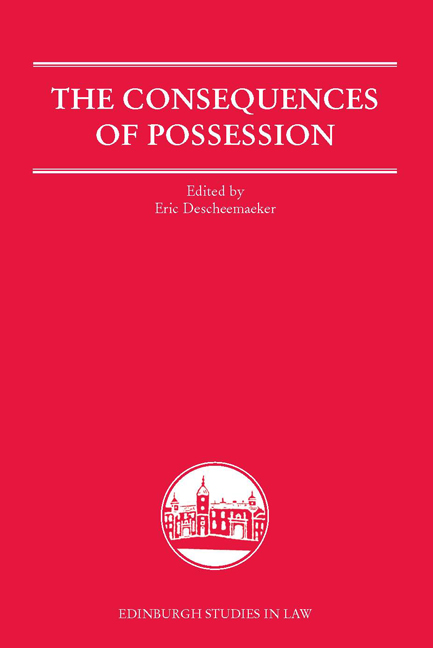Book contents
- Frontmatter
- Contents
- Foreword
- List of Contributors
- Table of Cases
- Table of Statutory Materials
- 1 The Consequences of Possession
- 2 Why Protect Possession?
- 3 Is Possession Factual or Legal?
- 4 Possession as a Source of Property at Common Law
- 5 The Evolution of Possessory Actions in France and Italy
- 6 The Protection of Possession in Scots Law
- 7 Possessio civilissima in Spanish and German Law: Protecting Possession between Fact and Fiction
- 8 Possession of Incorporeals
- 9 The Protection of Quasi-Possession in South African Law
- Index
9 - The Protection of Quasi-Possession in South African Law
Published online by Cambridge University Press: 07 December 2017
- Frontmatter
- Contents
- Foreword
- List of Contributors
- Table of Cases
- Table of Statutory Materials
- 1 The Consequences of Possession
- 2 Why Protect Possession?
- 3 Is Possession Factual or Legal?
- 4 Possession as a Source of Property at Common Law
- 5 The Evolution of Possessory Actions in France and Italy
- 6 The Protection of Possession in Scots Law
- 7 Possessio civilissima in Spanish and German Law: Protecting Possession between Fact and Fiction
- 8 Possession of Incorporeals
- 9 The Protection of Quasi-Possession in South African Law
- Index
Summary
From a comparative law perspective, the South African legal system is usually classified as a “mixed legal system”. This indicates a mixture between civil law (Romano-Germanic law) in the form of Roman-Dutch law and English common law. Unlike most civil-law systems on the European continent, South African law is not codified. This means that the law is to be found in various sources: primary sources such as legislation, case law and common law and secondary sources such as modern scholarly writings. The South African constitution contains a bill of rights which recognises common law and it requires the courts to interpret and develop common law in such a way that it promotes the spirit, purport and objects of the bill of rights.
Our common law, in the form of Roman-Dutch law, was transplanted to the Cape of Good Hope in 1652 when the East India Company (Vereenigde Geoctroyeerde Oost-Indische Compagnie or VOC) established a refreshment station there. The exact meaning of “Roman-Dutch law” is not always clear. There exists a narrow approach that suggests that only the seventeenthand eighteenth-century institutional writers of the province of Holland are authoritative. Of the seven provinces of the Dutch Republic, Holland was the most prominent as the political and economic centre. However, there is also a wider approach that Roman-Dutch law developed during the reception of learned law in the whole of Western Europe from the eleventh century onwards and that it is part of the Roman-canon ius commune. Although the narrow approach is supported by a judgment of the Appellate Division of 1949, the courts generally follow the wider approach.
There are several areas of South African law that are strongly influenced by the English common law, especially in the field of procedural law and commercial or mercantile law. However, as far as property law is concerned, of which the law of possession forms part, the basis is Roman-Dutch with very strong roots in Roman law.
- Type
- Chapter
- Information
- The Consequences of Possession , pp. 185 - 210Publisher: Edinburgh University PressPrint publication year: 2014



